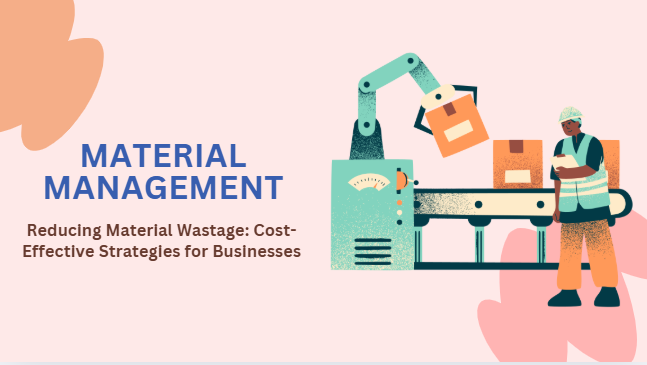
Reducing material waste has become a crucial goal for companies in all sectors in an era where cost-effectiveness and sustainability are paramount concerns. Effective material management not only reduces operational costs but also promotes environmental conservation. Professionals can develop the abilities required to implement significant initiatives through advanced education possibilities such as the PGDM in Material Management Courses. This article discusses the benefits of taking a PG Diploma in Material Management or other programs and examines doable, affordable ways to reduce material waste.
Understanding Material Wastage and Its Impact
When resources are mismanaged, thrown away too soon, or used insufficiently throughout production processes, material waste results. This results in higher costs, lower profits, and a considerable environmental burden. Businesses require sophisticated systems for effectively monitoring, controlling, and reducing waste. This is where material management specialists trained in Top PG Diploma in Material Management programs can make a big difference.
Strategies to Reduce Material Wastage
Implementing Efficient Inventory Management
Businesses that practice effective inventory management minimize overstocking or understocking and maintain ideal stock levels. Professionals who completed a Material Management Course may use inventory management systems to effectively estimate demand, track stock levels in real time, and prevent products from becoming obsolete.
Adopting Lean Manufacturing Practices
Eliminating waste in all stages of production is the main goal of lean manufacturing. Techniques like just-in-time (JIT) inventory and value stream mapping can aid in identifying inefficiencies. Those who have completed PGDM Material Management Courses are well-equipped to incorporate these approaches, resulting in seamless operations and low waste.
Recycling and Reusing Materials
Reusing and recycling materials can drastically save production costs and waste. Businesses, for example, can repurpose manufacturing leftovers or put in place procedures to recover and recycle end-of-life products. Knowledge gained from Best PG Diploma in Material Management programs can help firms establish sustainable recycling processes.
Training and Awareness Programs
Employees must be educated on the necessity of waste reduction. Regular training sessions can help employees grasp the proper methods for handling materials. Professionals seeking a PGDM in Material Management learn how to effectively plan and implement these programs.
Leveraging Technology and Automation
Material utilization can be optimized by cutting-edge technology like AI, IoT, and ERP systems. For example, predictive analytics can precisely predict material requirements, whilst automated solutions can eliminate errors and streamline procedures. Graduates of top material management programs are prepared to use these technologies to achieve cost and waste reduction objectives.
Supplier Collaboration
Material waste can be decreased by working with suppliers to optimize procurement procedures. Negotiating bulk purchases, ensuring timely deliveries, and maintaining open communication channels are critical methods. Professionals who have completed PGDM in Material Management programs are well-equipped to develop excellent supplier connections.
Monitoring and Auditing Processes
Finding material utilization inefficiencies might be aided by routine audits. Businesses that closely monitor their processes might identify areas for improvement. Courses such as the Best PG Diploma in Material Management teach the analytical abilities required to conduct extensive evaluations.
The Role of Education in Material Management
The secret to being an expert in material management is having a solid educational background. Specialized programs, such as the Top PG Diploma in Material Management, provide in-depth education and practical expertise in inventory control, procurement, logistics, and supply chain management. These courses allow professionals to
- Create novel solutions to reduce waste.
- Boost the effectiveness of operations.
- Adopt sustainable procedures that adhere to international norms.
Career prospects can be greatly improved by selecting the Best Material Management Courses or by enrolling in a PGDM Course in Material Management. These programs are designed to provide professionals with the tools and techniques they need to flourish in their professions and make important contributions to their businesses.
Benefits of Reducing Material Wastage
Reducing material waste offers far-reaching benefits for enterprises.
- Cost Savings: Production costs are directly reduced by the efficient use of materials.
- Enhanced Productivity: Process simplification lowers downtime and boosts general effectiveness.
- Sustainability: Cutting waste helps protect the environment and supports international sustainability objectives.
- Enhanced Reputation: Businesses that prioritize waste reduction frequently receive good feedback from customers and stakeholders.
Conclusion
Material waste reduction is becoming a commercial necessity rather than merely a best practice. Businesses can save money while encouraging sustainability by implementing cost-effective practices such as lean manufacturing, efficient inventory management, and the use of technology. Pursuing educational possibilities such as the PGDM in Material Management or PG Diploma in Material Management provides professionals with the necessary skills and expertise to effectively lead these efforts.
For individuals who want to succeed in this sector, investing in top material management courses is a wise choice. It not only prepares people to face complicated issues, but it also establishes them as valuable assets in a competitive market. A commitment to eliminating material waste will produce long-term economic, environmental, and reputational benefits for enterprises of all sizes.



